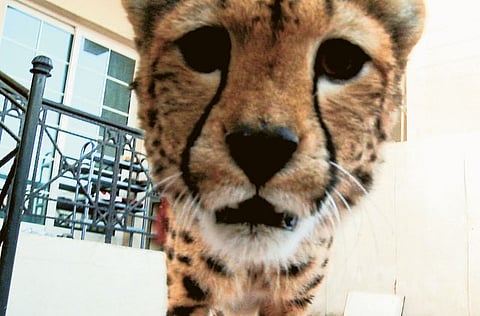Fatal attractions: Wild side of the UAE
Documentary by Emirati reveals over 3,000 people in UAE keep dangerous animals as pets

Dubai: Over 3,000 people in the UAE have wild animals as domestic pets, reveals a hard-hitting documentary by a young Emirati filmmaker.
In what could be the boldest expose yet, Marwan Al Hammadi, 22, a third-year student of applied communications at the Dubai Men's College has produced a 15-minute short film titled Cats which zooms into villas and farms across the UAE where proud owners talk about their prized possessions as the majestic cats lounge around them.
The documentary, chosen from thousands of entries in a student competition, will be aired at the fifth Gulf Film Festival beginning in Dubai on April 10.
An exclusive preview of Cats on Tuesday indicated that the stories portrayed could be the tip of the iceberg. In a revealing preface, the film claims that over 3,000 people in the UAE have wild animals as domestic pets. Of those, many own three or more.
The Arabic commentary (with English subtitles) set against images on a mobile phone screen is no coincidence. "In fact, the idea of making the film came from the phone as pictures of exotic cats are being exchanged all the time. So I wondered who these people were and where the animals came from. I was surprised when I learnt the huge number of exotic animal owners, some of whom have more than 100 varieties, not just cats," said Al Hammadi, who directed the film along with Saeed Abbas Al Emadi, his junior in college.
The actual film opens with a pet owner pulling out a crate with a lion cub from his car at his spacious villa. He talks about how his family was shocked when he first brought the cub home. But they accepted him later, he says, even as the camera zooms in on the six-month-old cub at her playful best.
Another owner of a lion cub relates the challenges he had weaning away the cub from its mother in captivity. He asks his three children whether they love him or not. And they answer in the affirmative as they sit on a sofa, stroking their favourite pet.
A third owner of a two-year-plus cheetah is also sitting on a sofa in his villa with the animal by his side. He evidently got her when she was five months old and boasts about how she is with him "everywhere" - in the house, in the car and when he is with his friends. He even used to let her sleep on his bed.
Besides owners relating their experiences, images of chained or caged creatures at several homes stand out in sharp contrast to the sense of freedom these animals enjoy in the wild.
There is also a focus on the common practice of clipping animals' claws and teeth which is not just painful to the animals but denies them their basic faculties.
Inputs from a vet and an authority on exotic animals from Ras Al Khaimah stress the dangers of feeding them the wrong foods, raising them like domestic pets and bringing them illegally into the country. Even the cat owners acknowledge the need for a body that could help organise their tribe.
Al Hammadi said it took five months to complete the project which proved to be a huge learning experience.
"While filming, we actually got to play with some of the cubs, but we didn't feel right about it in the end. It was almost as if they had come here on a one-way ticket from the wild," he said.
There was another revelation: the pride associated with keeping exotic cats in the UAE. "It is in the personality of the people who live here. We live in a place of superlatives, the tallest, the biggest, the most exotic and so on. People want to apply that in their lifestyles as well. And they find ways to make it happen," said Al Hammadi.
As for how he managed to get access to homes with the big cats, he said he was refused by many owners.
He was thankful to those who consented as they did it in good faith. "My aim was only to depict reality, to show things for what they are."


